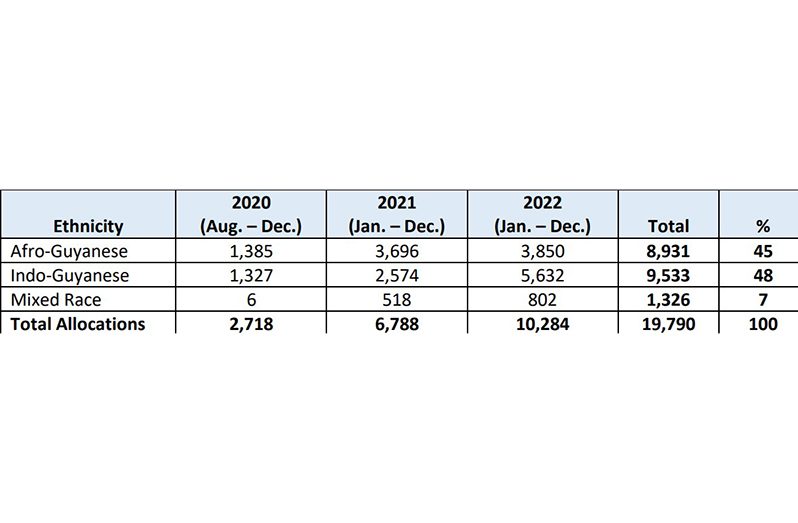–analyst concludes after review of IDPADA-G needs assessment
A REVIEW of the International Decade for People of African Descent (IDPADA-G) needs assessment has revealed the untrue nature of its claims that Afro-Guyanese are subject to discrimination related to government’s policies, programmes, and even the distribution of resources.
Financial analyst, Joel Bhagwandin, who conducted the study of IDPADA-G (2015-2024), the Guyana situation/IDPADA-G’s strategic plan, concluded that opportunities for Afro-Guyanese have soared since 2020.
He determined: “[IDPADA-G] Guyana has failed to empirically demonstrate that discrimination exists in these respects.”
Bhagwandin also elaborated on the numerous sectors in which government’s policies and initiatives as well as allocation of resources are done in an equitable manner.
Referencing the “Because We Care” initiative, which was reintroduced by the governing People’s Progressive Party (PPP) administration, the document highlighted that the financial aid has increased from $15,000 per child in 2021 to $25,000 in 2022, and to $40,000 in 2023.
The cash grant is an annual direct cash transfer intended to improve attendance and reduce dropouts for school-aged children enrolled in both public and private schools from nursery to secondary levels.
Notably, 192,000 children received the cash grant in 2021, and 196,000 in 2022.
“In 2023, over 214,000 children in public and private schools will benefit from [the] $40,000 cash grant ($35,000 “Because we care cash grant” and $5,000 uniform grant), for which $8.6 billion was allocated in the 2023 budget,” the critical review underscored.
ACCELERATED HOUSING DRIVE
Data analysis has shown too that since 2020, Guyanese from all walks of life have greatly benefited from the massive housing drives carried out by the Central Housing and Planning Authority (CH&PA), which is overseen by the Ministry of Housing and Water.
Since the Housing Ministry was “underproductive” prior to 2020, the PPP government had inherited 70,060 pending applications across Guyana’s 10 administrative regions in August 2020.
According to Bhagwandin’s analysis: “The process by which the Central Housing and Planning Authority allocates house lots and housing units does not allow for there to be any marginalisation in relation to who is allocated a house lots or house[s] in a particular housing area,” emphasising: “Persons who have acquired a house lot or house can use their title of ownership and a guarantee letter from the CH&PA to obtain a low-interest loan from a commercial bank at low interest rates.”
Importantly, among several key achievements of the CH&PA, over 21,000 house lots were allocated from 2020-2022, primarily to low and middle-income households along with the construction of over 1,200 housing units for low- and moderate-income households and young professionals.
Additionally, by 2022, over 800 squatter families were regularised, and the CH&PA constructed core homes and provided Home Improvement Subsidies for over 300 vulnerable families between 2021 and 2022.
“Provision of vouchers was launched in 2022 to provide the steel and cement required for the construction of foundations to over 667 house owners who were allocated house lots from the CH&PA, mainly in coastal regions where the majority of Afro-Guyanese live,” Bhagwandin highlighted.
He further outlined a table which included the total number of allocations done during the period of August 2, 2020, to December 31, 2022. The data showed that based on geographic location, 45 per cent of the house lots distributed were to Afro-Guyanese, 48 per cent to Indo-Guyanese and the remaining seven per cent to persons of mixed races.
For 2020 and 2021, 54 per cent of the offers/lots were accepted by Afro-Guyanese while, 38 per cent were taken-up by Indo-Guyanese.
“In 2022, the percentage of lands allocated to Afro-Guyanese slightly decreased as compared to the total given to Indo-Guyanese. This is a result of the location of housing schemes that were established in 2022 and the applicants’ choice to accept offers for those housing areas,” the document highlighted.
Bhagwandin, based on his analysis, concluded that Guyana is irrefutably ahead of many countries insofar as the objectives of the United Nations International Decade for the People of African Descent is concerned.


.jpg)











